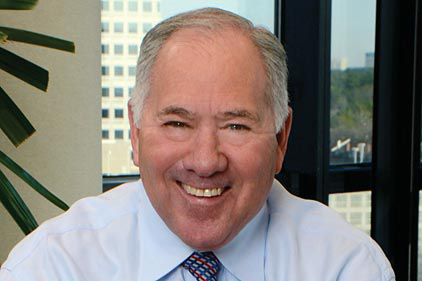President-elect Donald Trump announced his choice for Labor chief, and while the nominee’s name may be relatively unknown, a look at his ideology reveals that his nomination is not much of a surprise. Indeed, throughout his campaign Trump has derided President Obama’s regulatory action, and during a recent stop in Des Moines, Iowa, Trump promised to do away with regulations that are stifling economic growth.
“On regulations, we’re going to eliminate every single regulation that hurts our farms, our workers and our small businesses,” he pledged. In a sign that he is serious about rolling-back President Obama’s regulatory actions and streamlining the economy, Trump nominated fast-food executive Andrew Puzder to head the Department of Labor.
Mr. Puzder, CEO of CKE Restaurants, Inc., which owns Hardee’s and Carl’s Jr., shares the President-elect’s critical views of Obama’s regulatory actions. He was an adviser to Trump during the campaign, and in recent years, Mr. Puzder has been an outspoken critic of the labor-related policies and regulations implemented by the Obama administration.
Here, we take a quick look at what Mr. Puzder’s appointment might mean for employers and the change in direction expected from a Labor Department under Mr. Puzder:
Minimum Wage
Mr. Puzder has long been an outspoken critic of the Obama and Big Labor push to increase the minimum wage. In a June 2014 op-ed in the Wall Street Journal, Mr. Puzder explained his position that an increase in the federal minimum wage would result in a decrease in employment opportunities for minimum wage workers. “The bottom line on labor: Make something less expensive and businesses will use more of it. Make something more expensive and business will use less of it,” Mr. Puzder wrote.
Although President-elect Trump appeared to be open to some minimum wage increase on the campaign trail, don’t expect a Mr. Puzder-led Labor Department to take the lead in pushing for a significant increase in the federal minimum wage.
Overtime Eligibility Expansion
One of President Obama’s signature regulatory pushes was his plan to more than double the salary threshold of the “white collar” exemption test. Under federal law, most employees are eligible for overtime pay for all hours worked over 40 in a week. “White collar” employees (executive, professional, and administrative) are exempt from the overtime requirements and are typically paid a salary, rather than hourly. Under the Obama overtime regulations, the minimum salary threshold was set to more than double (from $23,660/year to $47,476/year), making an estimated 4.2 million more workers eligible for overtime pay.
Mr. Puzder has vocally opposed the Obama administration’s plan to expand overtime eligibility ever since the administration first proposed it. In a September 2016 op-ed piece published in the Wall Street Journal, Mr. Puzder stated that the new overtime regulations would hit the “businesses that need and hire the most employees” the hardest, “creating a competitive advantage for firms that require fewer employees.” And he predicted that to remain competitive, “restaurants will need to reduce labor costs by eliminating positions, reducing employee hours, accelerated automation and slowing expansion.” Mr. Puzder’s preferred solution: a free market without onerous federal regulations. “A freer market would do much more to improve worker’s lives than the Labor Department’s new regulation,” he wrote.
Although this rule has been temporarily halted by a federal judge in the Eastern District of Texas, the DOL has appealed the ruling to the Fifth Circuit Court of Appeals and has asked for an expedited hearing on the case. If the case is still pending when he takes office, expect Mr. Puzder’s Department of Labor to drop any remaining appeal. He may also order the agency to take a fresh look at the regulations, and begin the process of promulgating new regulations to overturn or modify this new rule.
Obamacare
In an October 2016 op-ed in the Wall Street Journal, Mr. Puzder cited the Affordable Care Act as a cause for the downturn in consumer spending at restaurants, even noting that in the past year, “eight major restaurant companies, representing at least 12 chains, including Cosi, Logan’s Roadhouse, Old Country Buffet and Zio’s Italian Kitchen, have filed for bankruptcy.” Mr. Puzder went on to explain, “One doesn’t need to be an economist to see that Obamacare is reducing consumer spending, resulting in a reduction in restaurant visits.”
Employers can expect Mr. Puzder to fully support President-elect Trump and Congressional Republicans’ efforts to repeal and replace the Affordable Care Act, and limit the regulations and burdens imposed by health care on employers.
Joint Employer Revisions
Another Obama administration focus has been on revising and broadening the joint employer standard. It has been a concerted effort to hold host employers responsible for actions by their subcontractors and franchisors responsible for their franchisees. For example, in August 2015 the National Labor Relations Board (“NLRB”), the federal agency that oversees federal labor law, completely revamped its joint employer test, overturning 30 years of settled precedent. Whereas, previously, a finding of joint employer status required some direct control by the host employer over another employer’s employees, the NLRB changed the standard to require only an “indirect relationship” between the two companies. In January, Obama’s DOL followed the NLRB’s lead and issued “guidance” that broadly redefined the joint employer standard as well.
Mr. Puzder, who is intimately familiar with how franchises work, has been clear on his opposition to such a change. In a June 2014 hearing before the House Subcommittee on Health, Employment, Labor and Pensions, Mr. Puzder stated: “If the NLRB were to change that standard so as to hold franchisors responsible as joint employers with their franchisees, it would significantly and negatively impact both the franchise business model and the small businessmen and businesswomen who have invested their time, energy and money in the hopes of becoming successful franchisees. Not only is this impractical and contrary to hundreds of thousands of existing contractual relationships, but it is also detrimental to the franchise model, which gives franchisees the power to make decisions that they consider the most financially prudent.”
As head of the Department of Labor, Mr. Puzder will have the authority to withdraw the DOL’s “guidance” on the joint employer test. Mr. Puzder can also throw the agency’s support behind legislation in Congress to codify the “direct control” standard that had been in place for over 30 years prior to the Obama administration.
Conclusion
Employers can expect Mr. Puzder to fully support President-elect Trump’s promises to roll-back the Obama administration’s regulatory push. For many years, he has been vocal in his belief that government needs to ensure that regulations do not stifle growth or needlessly hinder the economy. “Nonetheless, while most government officials recognize that raising taxes has a dampening effect on economic growth, there seems to be no similar acknowledgment with respect to the impact of regulatory costs,” Mr. Puzder said in a February 2012 hearing before Congress.
Although not all moves by President Obama can be immediately rescinded—for example, to overturn finalized regulations, the Trump administration will need to go through the regulatory process, including soliciting public comment and basing their decisions on evidence—pure executive actions and other agency guidance can, and likely will, be repealed by the new administration. And as for Obama’s formal rulemaking, employers can expect a Puzder-led DOL to get started on revising and streamlining regulations immediately to help ease the burden on employers and kick start the economy.
—
Richard D. Alaniz is a senior partner at Alaniz Schraeder Linker Farris Mayes, L.L.P., a national labor and employment firm based in Houston. He has been at the forefront of labor and employment law for over thirty years, including stints with the U.S. Department of Labor and the National Labor Relations Board. Rick is a prolific writer on labor and employment law and conducts frequent seminars to client companies and trade associations across the country. Questions about this article, or requests to subscribe to receive Rick’s monthly articles, can be addressed to Rick at (281) 833-2200 or ralaniz@alaniz-schraeder.com.
Thanks for reading CPA Practice Advisor!
Subscribe Already registered? Log In
Need more information? Read the FAQs





